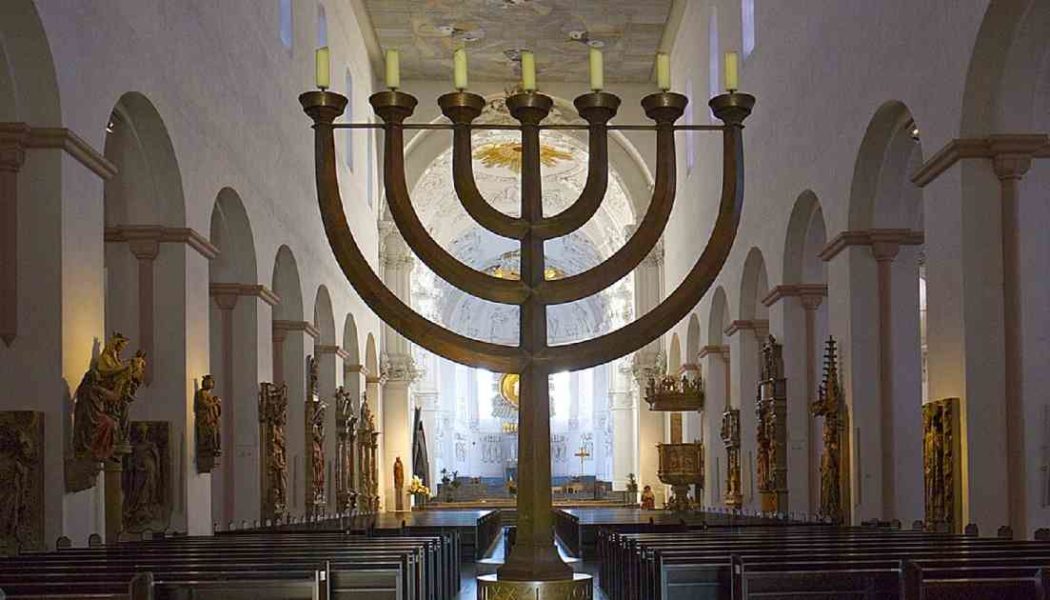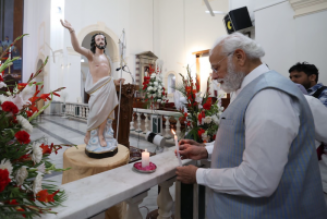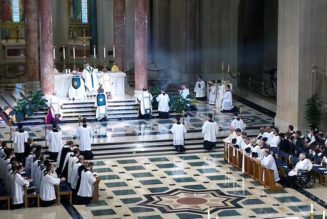
Jesus brings his listeners to a turning point in his own “Eucharistic Congress” on the 19th Sunday in Ordinary Time, Year C.
In five straight Sunday Gospels after the National Eucharistic Congress, the Church is reading from the Sixth Chapter of John’s Gospel. In the first, Jesus took the food a boy gave him and multiplied it like a new manna, to show his power and to prepare for the Eucharist. In the second, he answered the doubts of the crowd with strong testimony suggesting he is a new Moses — and more. He commanded: “This is the work of God, that you believe in the one he sent.”
This Sunday is the third in the series, and Jesus starts to spell out something entirely new and shocking.
Given that their one job is to believe, Jesus’s audience gets off to a really bad start.
The Gospel of John says that Jesus is saying these things in “the synagogue in Capernaum.” He has announced his identity in a synagogue before, and now we hear how him say, “I am the bread of life” and “I am the living bread that came down from heaven; whoever eats this bread will live forever.”
His listeners respond as they have in the past. “Is this not Jesus, the son of Joseph? Do we not know his father and mother? Then how can he say, ‘I have come down from heaven?” They especially don’t like that he said “I am the bread that came down from heaven.” How dare a mere man from a humble family say things that only a great figure — a divine figure, in fact — could say?
The rest of the Gospel is a long answer from Jesus to that question. But at the very end, he adds something more, something new that the next two Sundays will dwell on. He says, “The bread that I will give is my flesh for the life of the world.”
This marks a turning point in the Gospel. With that line, what started out as an invitation to believe in something radical and shocking turns into an invitation to do something radical and shocking: To eat his flesh and drink his blood.
But we will get there next week. Before he mentions flesh and blood, his words are all about bread, and even then the Jewish people are having none of it. Why not?
They reject what Jesus says because they know the importance of bread in the Old Testament.
Last week, speaking outdoors to crowds, Jesus compared himself to the manna of the past — but his Jewish audience’s minds went immediately to the manna of the future. They knew he meant the “manna of the Messiah” that Brant Pitre describes in his book Jesus and the Jewish Roots of the Eucharist. This week, speaking indoors in the synagogue, he calls himself the “bread of life,” and his Jewish audience’s minds go to another reality Pitre explains: the Bread of the Presence.
This was the Holy Bread that was central to Jewish ritual ever since God commanded his people with detailed instructions on how to offer it with reverence in Leviticus and elsewhere. This bread was to be a weekly Sabbath offering that was “set in order before the Lord continually, as an everlasting covenant.” It consisted of 12 loaves, stand-ins for the Twelve Tribes of Israel, and it was kept on a golden table just outside of the Holy of Holies, a visible representation of God’s presence among his people in his covenant. A menorah was kept continually lit for the bread, much like a sanctuary lamp by the tabernacle in a Catholic Church.
The Hebrew word for “Bread of the Presence” literally means “Bread of the Face,” but for many years it was less helpfully translated “showbread” in English. It was veiled and only rarely seen by the people but was shown to them — thus, “showbread” — at special feasts. The priest would display the golden table of bread, saying, “Behold, God’s love for you!”
It was so holy that only priests could eat it, and the fact that David ate it in 1 Samuel 21 makes it possible to call him not just a king and prophet but also a priest. Jesus himself invokes the memory of David and the Holy Bread in Matthew 12.
Jesus intentionally evokes this Bread of the Presence again in his words in today’s Gospel.
Both he and his audience knew the ways bread was a sign of God’s love from the beginning to the end of the Old Testament.
At the beginning of the Old Testament’s story, the mysterious priest Melchizedek offers bread and wine for Abraham, and his action has been honored by the Jewish people ever since. At the end of the Old Testament’s story, Judas Maccabeus restores the Bread of the Presence to a rededicated Temple and relights the menorah. His action is celebrated by the Jewish people to this day in the Feast of the Dedication — Hanukkah.
But to understand just how seriously the Jewish people took bread as a sign of God’s love, we need look no further than today’s First Reading about the Prophet Elijah.
When the Catechism speaks about the Bread of Presence in the Temple, it speaks about Elijah. In this Sunday’s reading, though, Elijah is far from the Temple, fleeing from a death threat, when he gives up and asks to die, saying “This is enough, O Lord!”
God ignores his prayer for death and gives him the gift of life instead: An angel gives him a hearth cake, a jug of water and a command to go on his way. And he does. In fact, “Strengthened by that food, he walked forty days and forty nights to the mountain of God, Horeb,” says the reading.
This is the power of the bread of angels in the Old Testament: It is God’s pledge to help his people and to fortify them for their journey; even looking upon it gives them new energy and purpose. This is the tradition of Holy Bread that Jesus is invoking when he confronts his critics at Capernaum.
However, Jesus says that the bread he gives will last far longer than 40 days: It will last forever.
When Jesus says, “I am the bread of life,” he adds “that one may eat it and not die.” This is no longer a barley loaf or a hearth cake — this time what is offered is Jesus himself who says “I am the living bread that came down from heaven; whoever eats this bread will live forever.”
So Jesus has taken his listeners, and us, from the Old Covenant manna to the Old Covenant Bread of the Presence of God and now presents himself as the fulfillment of both.
How can people believe such a thing? Jesus gives the answer: the Father.
“No one can come to me unless the Father who sent me draw him, and I will raise him up on the last day,” he says. “Everyone who listens to my Father and learns from him comes to me.”
What does this mean? It means that we don’t get to faith by reason alone, but by trust. Why does a child believe her father will give her what she needs? She may have no idea how the economy works or what exactly her dad does for a living, but she trusts her father and so she believes. It’s the same with us and God the Father. We don’t understand how providence works, but we trust, and God provides.
Likewise, we don’t fully understand the how and why of the mystery of the Eucharist — but we have come to trust the Father, so we accept that he is present in the Blessed Sacrament. Faith follows trust.
As it turns out, the reason God demanded strict ritual and reverence for the Bread of the Presence for so many years was to build that trust: He gave them the Bread of the Presence in the Temple to prepare them to accept his Real Presence in the Eucharist. And that preparation worked for many Jewish people.
St. Paul was so convinced by the Eucharist that he uses Eucharistic “Temple” language to exhort us to love.
Hearing this Sunday’s Second Reading, we can imagine the Bread of the Presence on the table in the Temple or the Blessed Sacrament on the altar of a church when Paul describes how we should love the Lord:
“Live in love, as Christ loved us and handed himself over for us as a sacrificial offering to God, for a fragrant offering to God for a fragrant aroma,” he says.
He describes how to act — replacing anger with forgiveness — but sums up his advice with a startling phrase: “Be imitators of God.”
Imitating God is not possible for mere creatures. One thing makes it possible: Uniting with God himself. Those who ate the Bread of the Presence in the Old Covenant were fortified to do God’s work on earth; those who eat the Bread of the Real Presence in the New Covenant are sanctified to be God’s work on earth.
And that is what Jesus is asking of us on this third Sunday in his “Eucharistic Congress.”
Jesus Christ’s own Eucharistic teaching will come to a climax in the final two Sundays yet to come, after the turning point we reached today.
In our home, I developed five rhyming lines for the five Sundays we are living through.
- What we give, he multiplies.
- In his life, he testifies.
- With his flesh, he fortifies.
With that we can already go far.
In the communion line this Sunday, pray for the grace to give more, trust more, and love more — and stay tuned for the final two lines.
Image: Church Menorah, Wikimedia.









